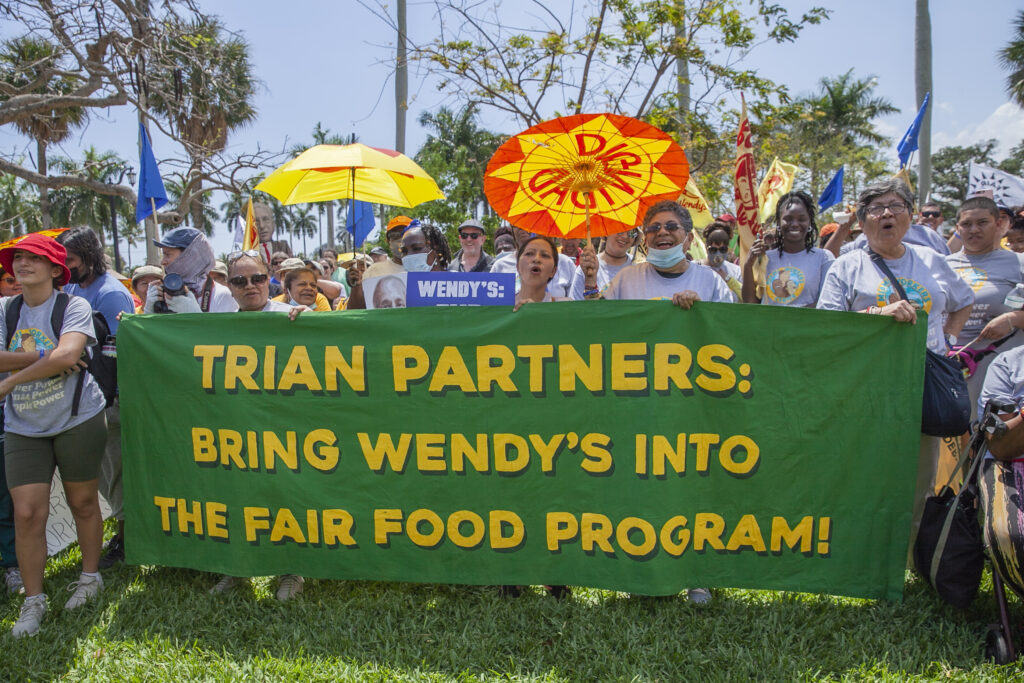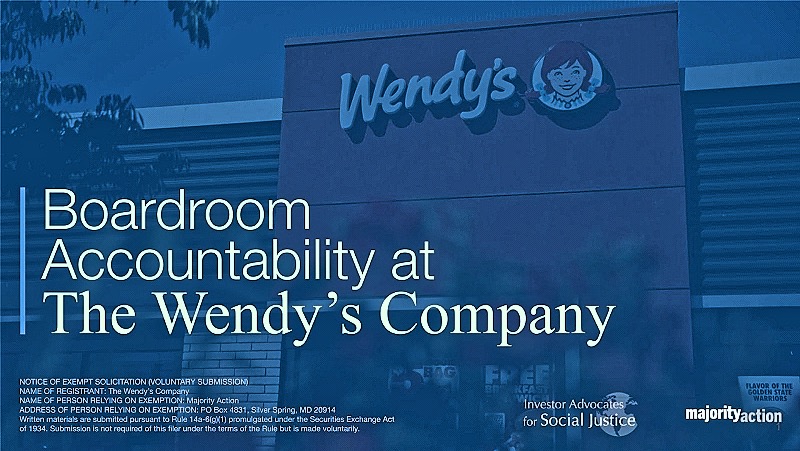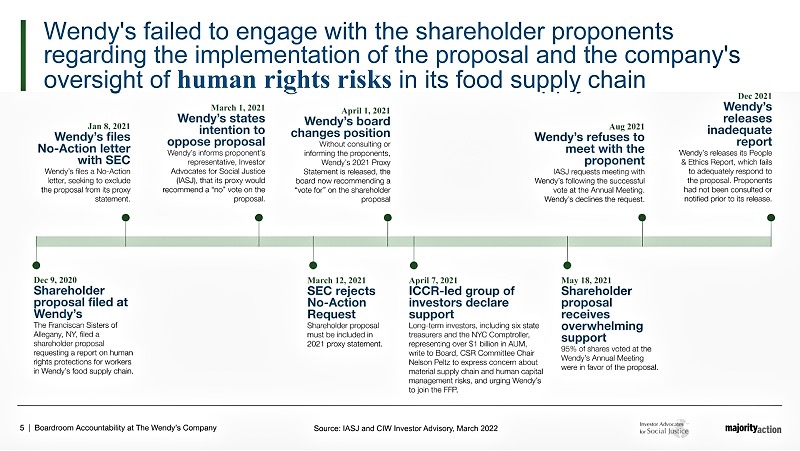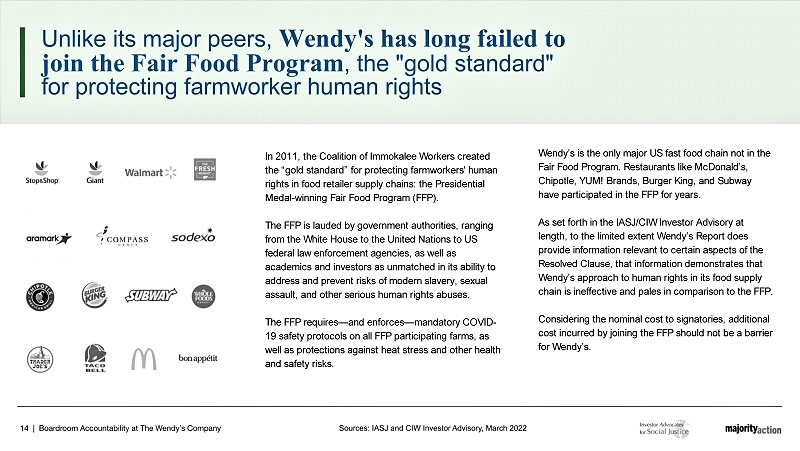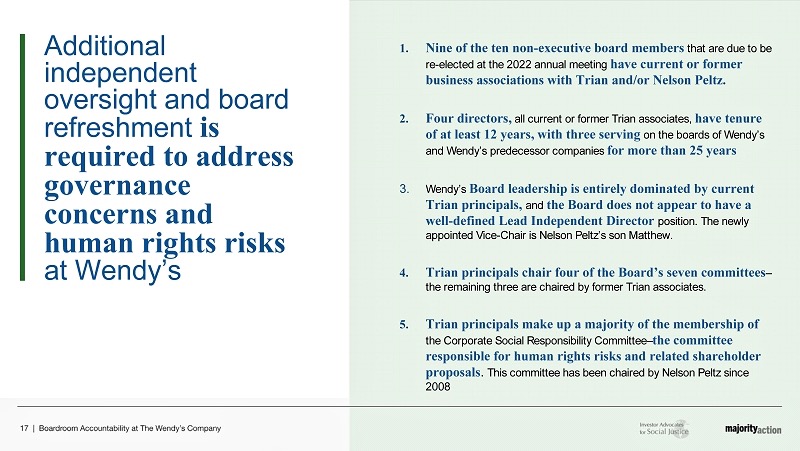
Shareholders demand Board accountability, mobilize to vote NO on retaining four top Wendy’s Board members — Nelson Peltz, Peter May, Matthew Peltz, and Peter Rothschild — at Wendy’s annual meeting next month!
Corporate accountability pioneer Majority Action, together with faith-based shareholder leader Investor Advocates for Social Justice, officially roll out “Vote NO” campaign:
“Wendy’s failed to adequately respond to a majority vote shareholder resolution on the protection of workers in its food supply chain”
“Directors with current and former links to Trian dominate board membership, limiting independent board oversight.”
“Additional independent oversight and board refreshment is required to address governance concerns and human rights risks at Wendy’s.”
You can join farmworkers from Immokalee at a rally this May 12th outside Wendy’s Board Chair Nelson Peltz’s Midtown Manhattan offices in support of the shareholders’ “Vote NO” campaign! Register for the action here.
*****
No one will ever confuse a corporation with a democracy.
But along one important dimension — corporate governance through shareholder and Board decision-making — corporations can start to look just a little more democratic, if you squint hard enough.
If you think of a public corporation as a small country, with the shareholders its citizens and the Board of Directors their elected leaders, then the image of a corporation as a democracy — complete with social, environmental, and governance responsibilities — begins to come into view. And that picture of corporate social responsibility through effective governance holds together as long as shareholders’ concerns are heard and Board members remain within the bounds of their role as part of a collective decision-making body charged with taking shareholder input and considering corporate concerns from multiple perspectives.
But the similarities don’t end there. Just as democracies can be lost to leaders with illusions of autocracy, corporations can lose their way and be captured by Board members who would disregard their shareholders’ concerns, dominate decision-making, and dictate outcomes, even when those outcomes might be demonstrably counter to the corporation’s own best interests. At that point, just as it is in a democracy, it is time for the leadership to change, because if the leaders stop listening to those who elected them, then the whole decision-making machinery breaks down, and the leaders must go.
And that — calling for the removal of four long-serving members of Wendy’s Board of Directors, in an effort to hold the Board accountable for Wendy’s failure to listen to its shareholders and adequately address its “longstanding troubling record on oversight of risks related to human rights and worker protections in its food supply chain” — is exactly what some Wendy’s shareholders are mobilizing to do next month at the hamburger giant’s annual meeting.
How did we get here?…
Before we dive deeper into the details of the vote at next month’s shareholder meeting, let’s take a quick look back at the road that led a group of justice-minded Wendy’s shareholders to take this extraordinary step.
That road begins at this time last year, when the Franciscan Sisters of Allegany NY, an order of nuns who hold shares in Wendy’s, filed a shareholder resolution calling on the company to:
… issue a report, at reasonable cost and omitting proprietary information, addressing Wendy’s Supplier Code of Conduct and the extent to which Wendy’s Quality Assurance audits and third-party reviews effectively protect workers in its food supply chain from human rights violations, including harms associated with COVID-19.
No longer willing to accept the company’s vague claims of social responsibility, these Franciscan Sisters called for an actual accounting of Wendy’s monitoring and enforcement efforts along a series of concrete, verifiable dimensions, from the number of times Wendy’s has suspended suppliers for violations of its code of conduct to the number of complaints workers have filed in their suppliers’ operations and the outcomes of those complaints. If the company was going to ask its shareholders to believe that its approach to social responsibility is on par with the Fair Food Program’s industry-leading standards and enforcement mechanisms, then shareholders were going to demand proof of the company’s claims, plain and simple.
After Wendy’s tried — but failed — to convince the SEC that the resolution should be excluded from the ballot, it came to a vote in May of last year. And what a vote it was! By an official tally of 95.28% in favor, the resolution for a true accounting of the “effectiveness and record of enforcement” of Wendy’s social responsibility was passed.
Speaking on behalf of the shareholders, Mary Beth Gallagher, the then-Executive Director of IASJ, which spearheaded the 2021 resolution efforts on behalf of its Franciscan Sisters affiliate, said:
“This shareholder approval makes clear that investors are seeking evidence that human rights systems are actually working to protect essential workers in the food supply chain. We urge the company to include all the concrete information sought by the resolution, so that we can truly compare Wendy’s efforts to the demonstrated success of the Fair Food Program.”
And so the “citizens” of Wendy’s had spoken. Now it was time for their elected “representatives”, Wendy’s Board of Directors, to implement the will of the company’s shareholders, produce a credible report, and provide proof that its social responsibility efforts were not only real, but truly effective.
Yet, even in the wake of a nearly unanimous vote, Wendy’s Board failed to hold up its end of the bargain.
Without engaging — or even so much as notifying — the shareholders who filed the resolution, Wendy’s issued a report in December of 2021 that fell woefully short of answering the clear and specific demands of the successful resolution. Among its many shortcomings, the report entirely ignored several key questions specified in the resolution (including how often Wendy’s requires third party audits, how many suppliers received third party audits, and how many workers are interviewed in the course of third-party audits); offered non-responsive answers to several others (reporting, for example, in response to a question about third-party grievance mechanisms in its supply chain, that workers in its suppliers’ operations “can report potential worker safety concerns… to Wendy’s”); revealed deeply unsatisfactory oversight of key safety risks (reporting, among other things, that Wendy’s “did not institute any new requirements specific to COVID-19”); and failed entirely to comment on the wave of modern-day slavery cases that occurred in the months between the passage of the resolution and the issuing of its report, even as that wave swept up one of Wendy’s reported tomato suppliers, Mastronardi.
And, most importantly, for those perhaps holding out hope that the overwhelming shareholder support for the resolution might finally prompt reform at the leadership level in the company’s overarching posture on human rights, Wendy’s report made it abundantly clear that nothing had changed within the four walls of Wendy’s boardroom. In a thoroughgoing analysis of the Wendy’s report — titled appropriately “Wendy’s Non-Responsiveness to Near-Unanimous Shareholder Resolution on Farmworker Human Rights and COVID-19 Demonstrates Substantial Failures of Governance and Oversight”, and co-authored with the CIW — IASJ wrote, “To the limited extent the Report does provide information relevant to certain aspects of the Resolved Clause, that information raises serious concerns regarding Wendy’s human rights risk management.” The conclusion of their analysis left no doubt that the report was entirely unsatisfactory to the shareholders who filed the original resolution:
Wendy’s non-responsiveness to the Resolution raises serious concerns about the Company’s oversight of human rights risks in its food supply chain, and its willingness to engage with shareholders in good faith. This non-responsiveness also suggests that Wendy’s irrational failure to join the Fair Food Program reflects larger governance issues at the Company.
It is therefore incumbent on investors to hold Wendy’s board accountable for that non-responsiveness, not to accept further evasion or lack of transparency by the Company, during the 2022 proxy season.
Key investors wasted no time in making their disappointment heard. The Franciscan Sisters of Allegany NY issued a statement to emphasize their own deep disappointment at Wendy’s non-responsiveness, as well as Wendy’s refusal to engage with them directly over the content of the report before publishing it, as is customary at other public companies:
“The Franciscan Sisters of Allegany NY filed this shareholder proposal seeking concrete information about the effectiveness of human rights protections for farmworkers in Wendy’s supply chain. Our proposal also highlighted that Wendy’s is the only one of its major competitors not to have joined the Fair Food Program, the gold standard for protecting farmworkers’ human rights. Even though the proposal received overwhelming support by a majority of Wendy’s shareholders, the company issued a report that was fundamentally non-responsive to the disclosures the shareholder proposal called for and on the substance of the issue itself. Despite our request, Wendy’s did not engage with us at all on the content of the report.”
New York City Comptroller Brad Lander echoed the Franciscan Sisters’ call:
“I am concerned about Wendy’s responsiveness to shareholder concerns regarding its human rights practices in its supply chain. Farmworkers have been asking for years for Wendy’s to engage in good faith to address human rights practices in its supply chain, yet the company remains alone among its peers in refusing to sign on to the worker-driven Fair Food Program despite shareholder support for action to protect workers. Wendy’s shareholders expect the company’s board to uphold its duty to respond meaningfully to shareholder proposals that receive majority support, yet the company has failed to do so on a proposal that received over 95% support last year.”
Deborah B. Goldberg, Massachusetts Treasurer and Receiver-General, expressed her concern as well:
“As State Treasurer, I am concerned about the integrity of a public company’s governance process. Wendy’s failure to honor a majority shareholder proposal on the issue of human rights in its food supply chain is startling to say the least. I signed the letter to Wendy’s because I believe in the Fair Food Program’s proven track record of protecting farmworkers’ rights and also for my concern about shareholder rights.”
No choice but a NO Vote…
Looking ahead to the 2022 Annual Meeting, the Franciscan Sisters’ statement on the Wendy’s report concluded: “Given the company’s refusal to engage productively with us as the proponent and heed the results of a majority vote, we have no choice but to call on fellow shareholders to join us in voting to hold the board accountable.”
And as of last week, that accountability has taken the form of a fast-growing campaign to remove four of Wendy’s top directors: Nelson Peltz, Peter May, Matthew Peltz, and Peter Rothschild.
Last week, IASJ joined forces with the widely-respected corporate watchdog Majority Action to file a devastating new analysis at the SEC (called an “exempt solicitation” in the inimitably obscure parlance of the investment world) that laid out in painstaking detail the history of the failure of Wendy’s Board of Directors to take the 2021 resolution seriously and the Board’s broader, longstanding failure to adequately address its shareholders’ legitimate concerns about worker protections in its supply chain, laying the fault for those failures at, first and foremost, the “disproportionate influence of Nelson Peltz and Trian Partners of Board leadership positions.” The exempt solicitation begins succinctly with this image:
We highly recommend taking the time to review their analysis, which you can find in its entirety here. It is a concise and compelling account of the culpability of Wendy’s leadership for the company’s multiple failures to adequately protect farmworkers’ fundamental human rights in their suppliers operations, and is as intelligible an analysis as can be found in the often arcane world of finance! Its timelines and clear graphics make plain the company’s abject abdication of responsibility for workers’ rights in the fields where Wendy’s buys its produce, and the urgent need for Wendy’s overarching approach to social responsibility to catch up with that of its competitors. Here below are just three examples of the report’s contents:
It is on the basis of this analysis that shareholders have launched the Vote NO campaign to remove four of Wendy’s top Board members.
And it is in support of that campaign that farmworkers from Immokalee will be heading to NYC next month to mobilize student, faith, and community allies, culminating in a major rally May 12th outside Trian’s corporate headquarters at 280 Park Avenue in the heart of the city’s corporate corridor, amplifying the shareholders’ efforts and calling on Wendy’s to, at long last, join the Fair Food Program.
“Peak Billionaire”…
As fate would have it, the battle for a more democratic economy was not limited to the fast-food industry this past week. At the same time that Wendy’s shareholders were launching their effort to take back control of the hamburger giant from one of the world’s richest men and the Board that he and his hedge fund dominate, the world’s actual richest man, Elon Musk, was trying to seize control of the tech giant Twitter in a hostile takeover — and against the wishes of an enormous contingent of Twitter employees and other stakeholders. In an excellent article, titled “This Is Elon Musk at ‘Peak Billionaire,'” Washington Post opinion writer Christine Emba argued against Musk’s bid:
… There are reasons power is usually distributed. Companies tend to have boards of directors (recall that Twitter invited Musk to be on one) to share knowledge, expertise and responsibility among many. Without this structure, a business risks being controlled — and perhaps run into the ground — on the basis of one person’s fancy, or turned unilaterally to serve one person’s ends rather than those of the many who rely on the organization.
Governments are elected, and their most important powers — to tax, declare war, set policy for citizens — are dispersed and distributed for similar reasons. There is the added understanding that the policies they set are meant to be a reflection of the common good, not one single person’s idea of it… read more
Corporate boards may be many things that are not necessarily good for a healthy, democratic economy, but the concept of a board of directors did get one thing right: It starts from the idea that, when it comes to managing the interests of a large public company whose business touches the lives of a seemingly infinite number people and their concerns, collective and representative governance is more effective than individual control. If Wendy’s leaders won’t listen to the farmworkers who pick its produce, the consumers who buy its burgers, and now, even the shareholders who invest in its business, then it is time to change Wendy’s leaders!
Join us May 12th in NYC for an exciting rally, complete with the CIW street theater first performed at the massive Palm Beach March to End Modern-Day Slavery! And don’t forget to register if you are planning on coming to rally by clicking here.
In the meantime, come back soon for more details on the May 12th action, and see you in NYC!

